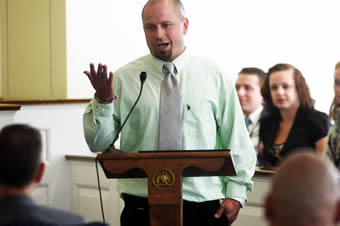

Human Services
Justice System (Youth and Adult)
Treatment Courts
Treatment Courts are specialized community courts designed to help stop the abuse of drugs, alcohol and related criminal activity. There are currently three treatment courts in La Crosse County: OWI Treatment Court, Drug Treatment Court, and Veterans Court. See below for additional information.- OWI Treatment Court
View policies and procedures for the OWI Treatment Court
View program evaluation for the OWI Treatment Court - Drug Treatment Court
View policies and procedures for the Drug Treatment Court
View program evaluation for the Drug Treatment Court
Adult Community Services (GPS monitoring, drug and alcohol testing, cognitive-behavioral groups, Ophelia's House)
The following services are provided to adults pending court or convicted of crimes in La Crosse County and are court ordered to the service. If you need more information, contact La Crosse County Justice Support Services at 789-4895.
GPS Monitoring:
- GPS monitoring is utilized by the courts as a tool to monitor behavior and increase public safety. GPS monitoring may be used for pretrial or sentenced clients, or as a sanction for rule violations in the treatment court. View requirements and guidelines and cost for GPS monitoring.
If you live outside of La Crosse County, please ask your social worker for permission to submit your GPS monitoring schedule by mail or fax. The forms are below, but if you mail or fax them without prior permission they will not be accepted. If you do have permission then print the appropriate form below and after completion send it to Justice Support Services, 333 Vine Street, Room 740, La Crosse, WI 54601. You can also fax your completed form to 608-785-5715.
Intoxicated Driver Program:
- The Intoxicated Driver Program is administered within the Justice Support Services Section of Human Services. Individuals convicted of operating while intoxicated (OWI) and related offenses, as well as those referred by the Department of Transportation, are required to be assessed by this agency. You can find out the status of your license by going to the Department of Transportation website and selecting online services on the main page, or follow this link: https://wisconsindot.gov/ .
Cognitive-Behavioral Groups:
Thinking for a Change (T4C) and Moving On – These are 2 separate 25 session cognitive-behavioral programs, T4C is for men and Moving On is for women. Both groups are facilitated in jail and in the community for men and women to develop social and problem solving skills to reduce involvement in the criminal justice system.
- Driving With Care – This 33 session program is for people who have had four or more OWI convictions involving serious accident or injury. The program objective is to reduce the frequency of drinking and driving, and to assist individuals to break their chemical dependence.
- SMART Recovery (Self-Management and Recovery Training) – This is a self-empowering addiction recovery support group for all types of addiction and addiction behaviors where participants learn tools for addiction recovery based on the latest scientific research and participate in a world-wide community which includes free, self-empowering, science-based mutual help groups. To visit the SMART Recovery website to access additional information, please click on the following link: www.smartrecovery.org.
- Seeking Safety is a model of counseling to help improve coping skills. This present-focused therapy is designed to help people attain safety from trauma, substance abuse, and/or posttraumatic stress disorder (PTSD). To visit the Seeking Safety website for additional information, click on the following link: http://www.seekingsafety.org/
Moral Reconation Therapy - MRT seeks to decrease recidivism among offenders by increasing moral reasoning. MRT implements a cognitive-behavioral approach, and uses 12-16 objectively defined steps which focus on seven basic treatment issues, including: Confrontation of beliefs, attitudes and behaviors; Assessment of current relationships; Reinforcement of positive behavior and habits; Positive identity formation; Enhancement of self-concept; Development of frustration tolerance; and Development of higher stages of moral reasoning. Justice Support Services offers gender-based groups of MRT.
Carey Guide Groups – Carey Guides are a set of evidence-based tools developed to work with clients on identified need areas through a cognitive-behavioral approach. With 33 topic areas to choose from, groups are tailored to the needs of the group participants.
Ophelia's House:
Ophelia’s House is gender-specific programming designed to provide wraparound services for the women participating in the program. They may include housing, and services such as Thinking for a Change, substance abuse services, trauma groups,
employment assistance. To visit the YWCA website for more information on Ophelia’s House, click on the following link:
https://www.ywcalax.org/what-were-doing/supportive-housing/
Current Initiatives in Justice Support Services:
WI Pretrial Pilot Site
Second Chance Re-Entry Act for Co-Occurring Disorders grant recipient 2017
- Adult Drug Court Discretionary Grant Program recipient 2017
- Evidence-Based Decision Making (EBDM) Initiative
- The State Criminal Justice Coordinating Council website describes the EBDM Initiative in La Crosse County
- La Crosse County's EBDM Initiative Application
Youth Justice Supervision
If a youth’s behavior leads to being charged with a crime they may enter the Youth Justice System either through Juvenile Detention if the charge warrants detention for the protection of the community or through a Youth Justice Referral Process from the police department. Either way the youth will meet with a Social Worker from La Crosse County’s Youth Justice Unit to recommend the proper course of action to the District Attorney’s Office (closure of case, deferred prosecution agreement, or further court involvement).
A Deferred Prosecution Agreement is a written agreement entered into by the youth, their parent(s)/guardian(s), and the social worker outlining the conditions and obligations to be met in order to defer the filing of a petition to the court. Such conditions and obligations can include but are not limited to: community service hours, restitution, mental health or Alcohol and Other Drug Abuse (AODA) counseling, or other services determined necessary to meet the needs of the youth. Should these conditions not be met, this agreement may be revoked and the court petitioned for further supervision.
Should it be recommended that the youth’s case go through court they may be placed on formal supervision. Based on Wisconsin State Statutes the intent of the legislature is to promote a youth justice system capable of dealing with the problem of juvenile delinquency, a system that will protect the community, impose accountability for violations of law and equip youthful offenders with competencies to live responsibly and productively. Youth supervision is managed by social workers through the Department of Human Services- Youth Justice Unit. It involves the protection of citizens from crime, holding youth accountable for their behavior and provision of treatment/services to build competencies. Social Workers oversee the behavior of youth in their home, school and community environments. There are a wide range of services and accountability options available to youth on formal delinquency supervision which vary anywhere from partnering with parents/caregivers to establish rewards and consequences in their home(s), teaching parents/caregivers new skills to address challenging behavior with an emphasis on the parent-child relationship, counseling services or cognitive behavioral group participation to tracking and monitoring programs to out-of-home placements if this becomes necessary for the protection of the community. Out-of-home placements can range from a local foster home to CORE Academy or the Department of Corrections with several options between.
For further information on La Crosse County’s Youth Justice System and Process, please see the following links:
Additional Statewide information can be found at:
- Youth Justice State Code (Chapter 938)
- Department of Justice
- Department of Children and Families - Youth Justice
Initiatives in La Crosse County Youth Justice
In 2008 La Crosse County Human Services called upon the Carey Group to complete a thorough examination of La Crosse County Youth Justice. The recommendations included the following:
- Creation of an inter-agency task force to study why La Crosse County arrests a disproportionate number of youth and determine if this is in the best interest of the public. The study found that La Crosse County juvenile arrest rates were much higher than both the state and three like-sized counties.
- Seek assistance from the Annie E. Casey Foundation Juvenile Detention Alternatives Initiative (JDAI) with disproportionate minority arrest and confinement issues. La Crosse County, as with the state of Wisconsin at the time, was found to have a disproportionate number of minority youth arrested and securely detained than their Caucasian counterparts.
- Completion of a risk assessment tool on every youth admitted to the La Crosse County Youth Justice System.
- Development of enhanced capacity to use information systems to assess progress toward unit outcomes.
Given the recommendations in the Carey Group Executive Summary on Youth Justice from November 2008, several system reform efforts have formed, with some funding assistance by the Department of Justice. These efforts include:
Participant in the Wisconsin State Detention Risk Assessment Instrument (DRAI) Committee
The primary task of this state committee is to develop and implement an objective detention risk assessment process for Wisconsin and ensure its effectiveness in distinguishing between youth who pose a pre-adjudicative public safety risk or a risk of not appearing at their hearings, from youth who do not pose such risks. Once developed, it is the expectation that those counties participating in this committee will actively implement the DRAI tool within their practice. La Crosse County along with the other participating counties have been using this tool as a pilot test as of January 1, 2015.
Revision and Implementation of a Risk Assessment and Case Management Tool
In March 2013 La Crosse County Youth Justice purchased the Youth Assessment and Screening Instrument (YASI) which is a validated risk assessment and case management tool. Changes to policy and procedure have now been put into place to ensure all youth entering the Youth Justice System are being assessed using this risk assessment tool.Juvenile Arrest & Disproportionate Minority Contact Task Force
Juvenile Justice Best Practice Committee
Creation of Inter-Agency Memorandum of Understanding
Frequently Asked Questions in Youth Justice


